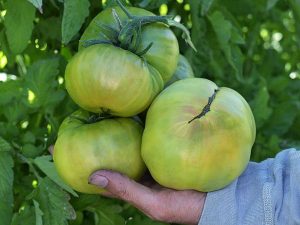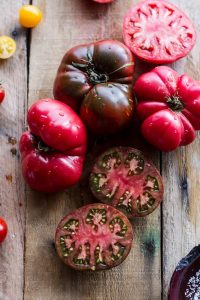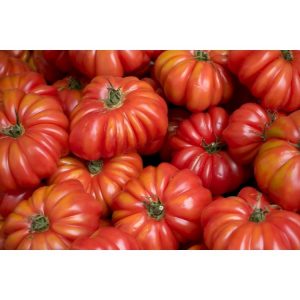Heirloom tomatoes look beautiful, taste amazing, and encourage the preservation of genetic diversity. They taste much better than standard tomatoes, too. In fact, there are heirloom taste competitions around the world. So what are they and how can you grow some? Here are the basics.
What is an heirloom tomato?
There over 10’000 kinds of tomatoes in the world. There are roughly two kinds of tomato seeds: first, open pollinated, which means they are pollinated by natural means like insects or birds. Second, created, or in other words, purposefully cross-pollinated with other parent tomatoes. This is helpful for developing certain characteristics like flavour or disease resistance.
Heirloom tomatoes are widely considered to mean ‘grown from seeds passed down through many generations in a family’. Some are created or cross-pollinated, others are open-pollinated. They are unique and very different than the consistent tomatoes in supermarkets.
There are some famous heirloom tomatoes, like Aunt Ruby’s German Green tomatoes, known for their incredible flavour.

Aunt Ruby’s German Green tomato. Originally from Germany but cultivated in the U.S., Ruby Arnold’s relatives called it Aunt Ruby’s tomato and the name stuck.
Why you should grow them
Farming tomatoes on a large scale for the kind you can buy in supermarkets requires tomatoes bred to look and taste the same, be easily shipped all year round, travel long distances and stay firm enough for easy slicing. This process harms the environment with pesticides. It also creates a large carbon footprint if they’re brought to your shelves out-of-season.
Heirloom tomatoes breed true, which means that seeds from one harvest can be used to grow the same tomatoes every year. When purposefully cross-pollinated, heirlooms are aiming for flavour instead of productivity and ease of packaging like standard tomatoes.
In fact, recent studies suggest heirloom tomatoes contain more chemicals specifically preferred by taste testers. They are called volatile chemicals, and there are less of them in commercially produced tomatoes. The Crimea heirloom tomato, for example, is renowned for its flavour.

Crimea heirloom tomato, also known as Black Krim tomato
Tips for growing heirloom tomatoes
You can buy seeds for heirloom fruits and vegetables from places like Organic Seeds, Seeds for Africa or Living Seeds. They range from R20 to R40 for between 10 and 50 seeds, depending on the particular type. And yes, you can order them online for delivery, too.
Once you’ve got the seeds, read up on tips for the specific heirloom tomato you have your hands on, as they’re unique and might have specific needs or be particularly susceptible to certain diseases. Generally speaking though, here are some tips:
- Plant seeds or seedlings in spring.
- Place them in a sunny spot with good drainage. Be careful not to plant them where you’ve grown plants in the tomato family (like peppers). Tomatoes can more easily catch diseases that are already in the soil otherwise.
- Plant them half a metre to one metre apart.
- Plant them deeply in the soil. Heirloom tomatoes often grow tall, so support is essential.
- For this reason, they might need trellis support. Make sure they have enough space to grow tall.
- They love hours of full, direct sunlight.
- Loamy soil for roots to penetrate is ideal.
- Tomatoes do best when constantly a bit moist. Allowing soil to switch between dry and moist hinders fruit development. Water them often.
- If they struggle with airborne disease like blight, consider a deep irrigation system.
- Fertilizer is key for big, healthy tomatoes.
Browse the huge selection of heirloom seeds online and get reading about any that catch your eye – and tag @SAgardenandhome if you begin your heirloom vegetable adventure!










